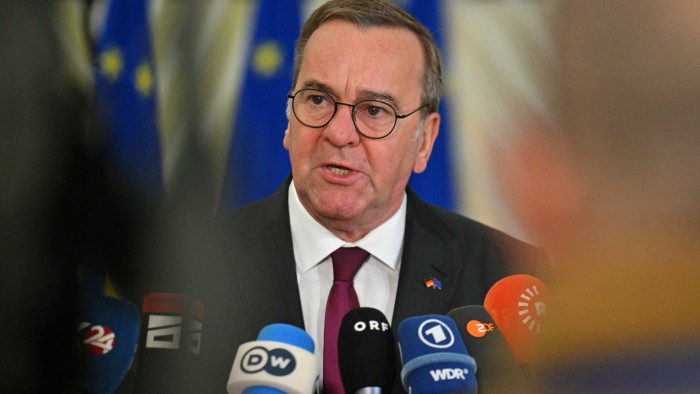Severing of Baltic Sea cables likely to be sabotage, Germany says

Unlock the Editor’s Digest for free
Roula Khalaf, Editor of the FT, selects her favourite stories in this weekly newsletter.
Damage caused to a pair of undersea communications cables in the Baltic Sea is likely to have been an act of sabotage, Germany’s defence minister has said.
Boris Pistorius said it was unclear who was responsible for what he described as a “hybrid” warfare tactic after the severing of two fibre optic cables within 24 hours — one between Germany and Finland and another between Sweden and Lithuania.
But he added: “No one believes that these cables were cut accidentally . . . Therefore we have to state, without knowing specifically who it came from, that it is a ‘hybrid’ action. And we also have to assume, without knowing it yet, that it is sabotage.”
Nato member states — including Sweden and Finland, which joined after Russia’s 2022 Ukraine invasion — have been on high alert after a series of attempted Russian sabotage attacks on the alliance this year including arson in Germany.
The most dramatic act of sabotage on Baltic Sea infrastructure occurred shortly after Russia’s full-scale invasion of Ukraine, when a series of explosions destroyed the Nord Stream gas pipelines connecting Russia to Germany. German authorities have pointed towards Ukraine as the culprit, although the investigation is still ongoing.
Last year, a gas pipeline and two data cables were cut in the Gulf of Finland by the anchor of a Chinese ship, although authorities have not said whether they believe it was an accident or done on purpose.
In light of the attacks, Nato members have stepped up surveillance of their tens of thousands of kilometres of cables and pipelines.
At about 8am GMT on Sunday, a communications cable between Sweden and Lithuania was damaged, the Swedish telecoms operator Telia said.
At about 2am GMT on Monday, the 1,200km C-Lion1 fibre optic cable that runs between Helsinki in Finland and Rostock in Germany was cut in the Baltic Sea close to Sweden, Finnish state operator Cinia said. It said the severing was almost certainly caused by an “external force”.

Pistorius’s assessment came as six European nations warned that Russia was “systematically attacking European security architecture”.
In a joint declaration, the foreign ministers of Germany, France, Poland, Italy, Spain and the UK said Moscow was conducting “escalating hybrid activities against Nato and EU countries” that they described as “unprecedented in their variety and scale”.
The ministers said common European security was “challenged as never before in our lifetimes” as they pledged closer co-operation and called for greater resources to be spent on European security and defence.
That included, in many cases, the need for nations to spend more than the Nato minimum of 2 per cent of GDP on defence, they said.
“Putin is playing with our fear,” German foreign minister Annalena Baerbock said after meeting the other signatories in Warsaw. “We cannot rely on promises from the Kremlin, instead we must ourselves invest in our security and protection.”
Baerbock said European countries were also united in defending “our own critical infrastructure”. She said Germany was the target of hybrid attacks and listed recent incidents including the discovery of parcel bombs at a German airport and now the severed cables. “These cannot all be coincidences,” she said.
Finnish officials said they did not want to jump to conclusions and were still establishing facts.
Jukka Savolainen, a director at the European Centre of Excellence for Countering Hybrid Threats, told Finnish radio: “If this was done by Russia, then it should perhaps be interpreted as a warning that they can do something bigger, and also as a test to see if we do something about it.”
Swedish authorities said they had started investigations.
Germany’s interior minister Nancy Faeser said Berlin was taking the situation “very, very seriously” and had offered to provide assistance to investigators.
Cartography by Steven Bernard
#Severing #Baltic #Sea #cables #sabotage #Germany





